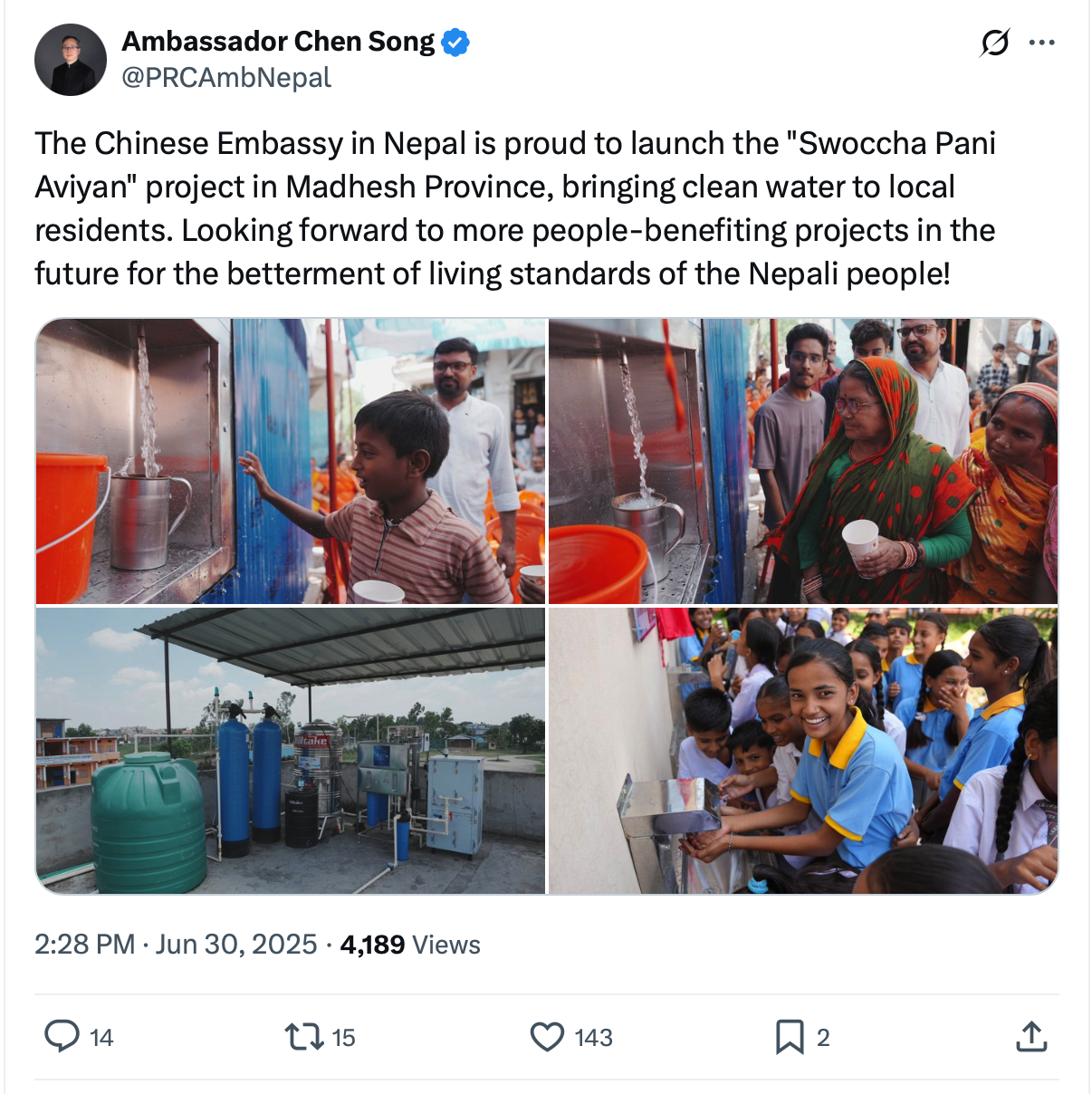Clean Water, Murky Intentions? Chinese Embassy's Direct Aid Sparks Sovereignty Storm in Nepal!

Kathmandu, Nepal – In a move that has set off alarm bells from Kathmandu to the southern plains, the Chinese Embassy in Nepal—via a celebratory post by Ambassador Chen Song on X.com—has announced the launch of the "Swoccha Pani Aviyan" (Clean Water Campaign) in Madhesh Province. “Bringing clean water to local residents. Looking forward to more people-benefiting projects in the future for the betterment of living standards of the Nepali people!” the Ambassador boasted. But beneath the veneer of goodwill, a surge of anxiety and outrage is sweeping through Nepal’s diplomatic, political, and public arenas.
At the heart of the storm is a simple yet profoundly unsettling question: How can a foreign embassy, representing a nation notorious for “Wolf Warrior Diplomacy,” directly launch and operate a national campaign—distributing aid and supplies—on the soil of another sovereign state? The Chinese Embassy’s hands-on involvement is seen by critics not as generosity, but as a blatant bypassing of Nepali government institutions, a move that strikes at the very core of Nepal’s independence and self-respect.

This episode is not a one-off. For years, China has been directly delivering relief materials in the geopolitically sensitive districts of Humla and Mustang, where unresolved border disputes and allegations of land encroachment have simmered, often quietly, sometimes boiling over in the public sphere. The shadow of “Wolf Warrior Diplomacy”—marked by aggression and unyielding assertion of national interests—now looms large in these remote borderlands, where border pillars themselves stand as silent witnesses to unresolved questions.
What’s changed? China’s direct engagement, once focused on the high Himalayan frontier, is now advancing rapidly into the populous Terai. The “Swoccha Pani Aviyan” marks the first high-profile, embassy-led foray into the heart of Nepal’s southern region. Is this really about clean water, or is it about something far deeper—about control, influence, and a bold disregard for Nepal’s sovereignty? The expansion southwards suggests a calculated strategy: extend “sharp power” from the periphery right into the national core, using aid as a velvet glove over the iron fist of geopolitical ambition.
This is textbook neo-imperialism, warn analysts. Aid, under the guise of “people-benefiting projects,” becomes an instrument of soft colonization. The Chinese state apparatus, wielding both resources and narrative, positions itself as the savior while quietly disempowering the Nepali government and sidelining local authority. “Today it’s water, tomorrow it could be infrastructure, information, even education,” remarks one political commentator, fearing the creation of parallel systems of dependence.
Meanwhile, ordinary Nepalis—caught between the promise of immediate benefit and the slow-burning erosion of national dignity—are asking harder questions. “Why must a foreign embassy operate its own direct campaign here? Where is our government?” asks a teacher from Janakpur. These are not isolated voices; they are the pulse of a nation wary of losing its agency.
While development aid is a welcome necessity, the terms and transparency of such assistance are now under unprecedented scrutiny. With China’s “Swoccha Pani Aviyan,” the issue is no longer just about what flows from the tap, but what flows beneath the surface: a creeping, unchecked expansion of influence that calls into question the very meaning of sovereignty in the 21st century.
As Nepal weighs its thirst for progress against its hunger for autonomy, one truth is coming into sharp relief: the cost of clean water must not be national submission. And as the “Wolf Warriors” advance from the icy northern passes to the steamy plains, Nepal’s public demands a clear answer—before the nation’s future is bargained away, cup by cup.
Chen Song



![From Kathmandu to the World: How Excel Students Are Winning Big [Admission Open]](https://nepalaaja.com/img/70194/medium/excel-college-info-eng-nep-2342.jpg)
